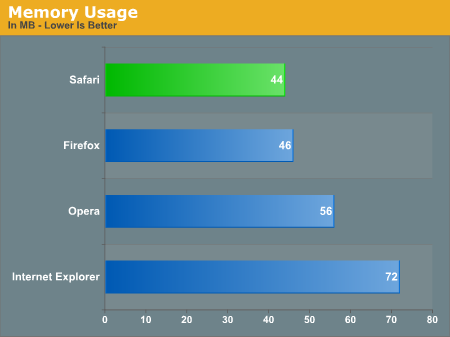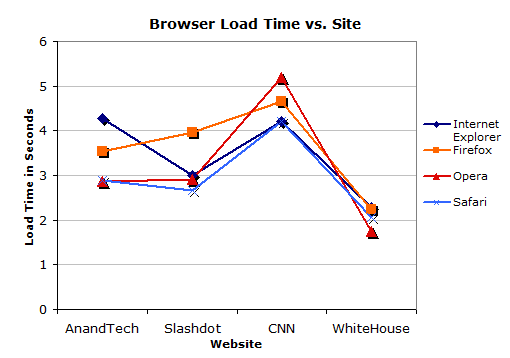Objective Testing
For testing memory usage we opened up each of our testing sites in a separate tab and then checked how much memory each application was using. Since we're now using Vista, the Internet Explorer results should be more representative of actual memory usage since it's no longer integrated in to Explorer.

Other than Internet Explorer at 72MB, the rest of the browsers are fairly close. Safari comes out on top at 44MB, barely edging out Firefox at 46MB.

Not surprisingly, there's no clear-cut winner as certain browsers tend to favor one site over another. Firefox is the slowest by a good margin, while IE and Opera do well except for faltering at rendering AnandTech and CNN respectively. In line with Apple's claims, Safari is the fastest browser on average, however it only actually takes Slashdot, otherwise it loses or is in a dead heat. We suspect that this is the case overall too, for most sites Safari won't be significantly faster than at least one other browser but it's fast enough to vie for the top.
Compatibility testing was surprisingly hard, largely because it's not a true compatibility test until we somehow manage to break something. Try as we might, the biggest incompatibility we could find was a minor graphical problem with a date header at the gaming news site Blue's News. Safari otherwise was able to properly render every site we visited. The only weakness we know of here, and this applies to every other non-Microsoft browser too, is that some sites still require ActiveX controls which only Internet Explorer supports.

Internet Explorer

Safari










28 Comments
View All Comments
Griswold - Saturday, July 7, 2007 - link
As for the RAM, you're right to a certain point. There are far too many people out there who like to stare at their unused RAM and feel proud that their system is so slim, sleek and... slow, because everything has to be loaded from the slow disk. RAM is here to be used, not to be left unused. End of story.But reality often isnt that simple. When software starts to unnecessarily hog RAM, resulting in disk trashing when its needed elsewhere, then its time to have a closer look and criticise.
Some older FF builds in the 1.5 days were like that. Have FF run for a full day and it would start to bloat up to several hundred megabytes thanks to caching too many previous visited sites in RAM. Manually reducing that number to a reasonable value trimmed down the RAM usage. Personally, I dont see that behavior in FF 2.x anymore.
Justin Case - Sunday, July 8, 2007 - link
Like I said, simply checking how much RAM a program is using tells you nothing about its _efficiency_. Most browsers let you choose how much RAM they can use for cache. If it doesn't respect that value, it's not "bloated"; it's buggy.For example, something that Opera has done for a long time and other browsers have only recently copied is this: cache the _rendered_ pages in the browser history. That way when you press the "back" or "forward" button, the page is there _instantly_, regardless of complexity. This makes a huge difference in the user experience and is a good use of 4 MB of RAM. The latest versions of Firefox do this, too. Not sure about MSIE.
crimson117 - Thursday, July 12, 2007 - link
"This makes a huge difference in the user experience and is a good use of 4 MB of RAM."I agree, as long as it releases ram it's not likely to use anytime soon.
If I've been browsing for a while and then load up a game to play, but keep the browser open, then I definitely don't need 400 MB of cached renderings.
Hopefully it would cache the rendered pages for the past few sites, but write to disk the render cache for older sites in my session to free up the ram.
Fede777 - Friday, July 6, 2007 - link
In the Subjective Testing page it says but it should sayFede777 - Friday, July 6, 2007 - link
My mistake, it's just that iTunes looks like safari on XPcmdrdredd - Friday, July 6, 2007 - link
The most interesting thing to me out of the whole article is the mrmory footprint chart. I never realized IE used so much memory as I don't check the usage.I downloaded Safari and it works quite nicely for me. I don't see one browser being vastly superior to another under normal usage though. I'm not so picky.
Nemokrad - Friday, July 6, 2007 - link
Safari 3.0.2 was released two weeks ago today. How come you didn't use it?Ryan Smith - Friday, July 6, 2007 - link
This article has been complete for longer than two weeks. We had some unusual circumstances that kept us from publishing it on time.solipsism - Friday, July 6, 2007 - link
I saw that and was able to read the first page before it was removed.What were the "unusual circumstances" for not posting it?
PS: AnandTech is a favorite read for me because of the detail that is usually spent on a topic/item but I found this review to be rudimentary. I would have like to see other speed tests done with heavy JS and Flash pages, a comprehensive overview of how WebKit differs from IE and Firefox engines, a detailed report of how Safari imported frameworks for OS X and not just a mention of the visual differences, and a comparison of HTML5 and CSS3 Open Standards used between the browsers. One in particular that Safari has is the ability to resize text boxes.
AnnonymousCoward - Sunday, July 8, 2007 - link
I don't need that kind of detailed analysis. Since the interface sucks and the window behavior is like a stubborn Mac window, the deal is off.